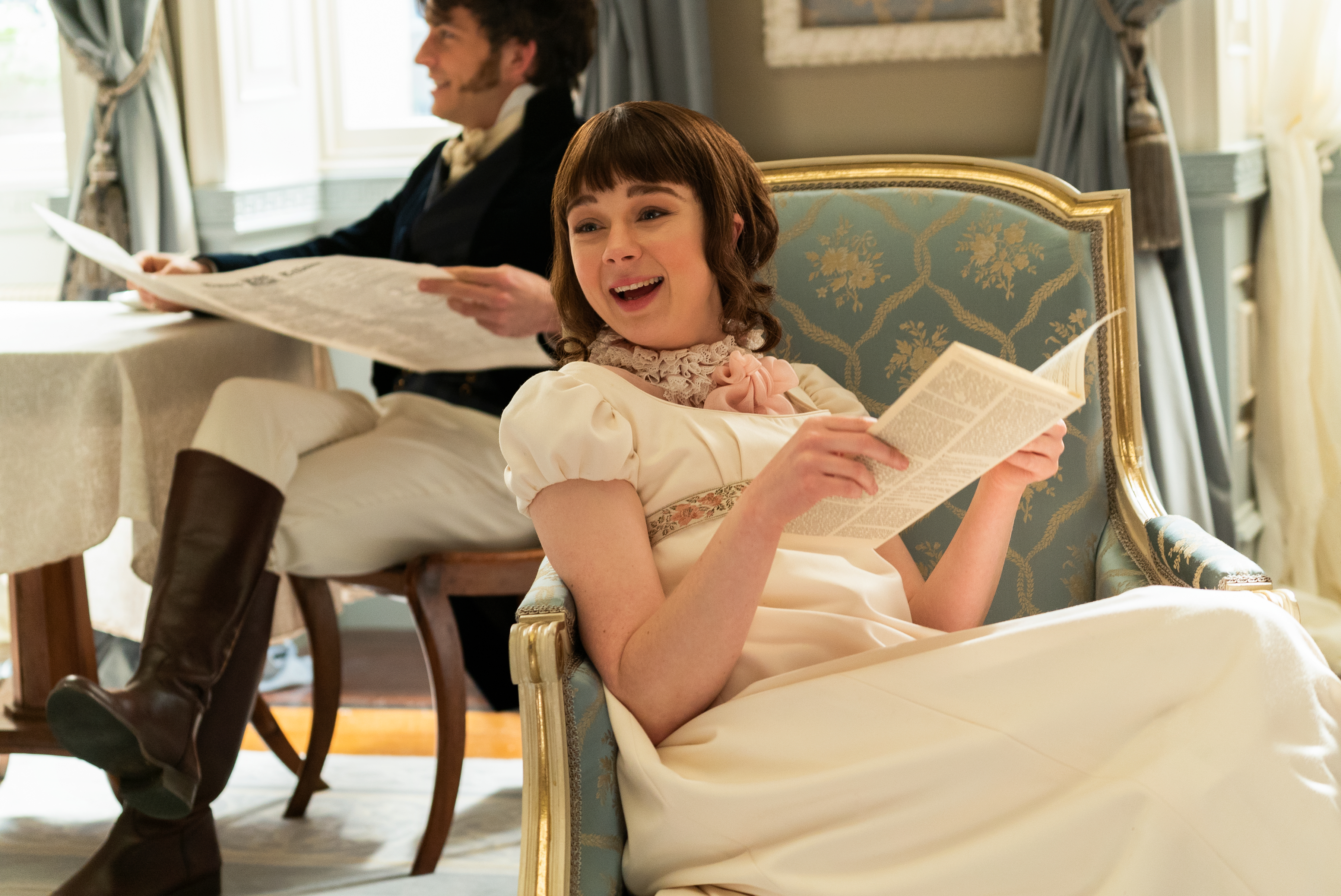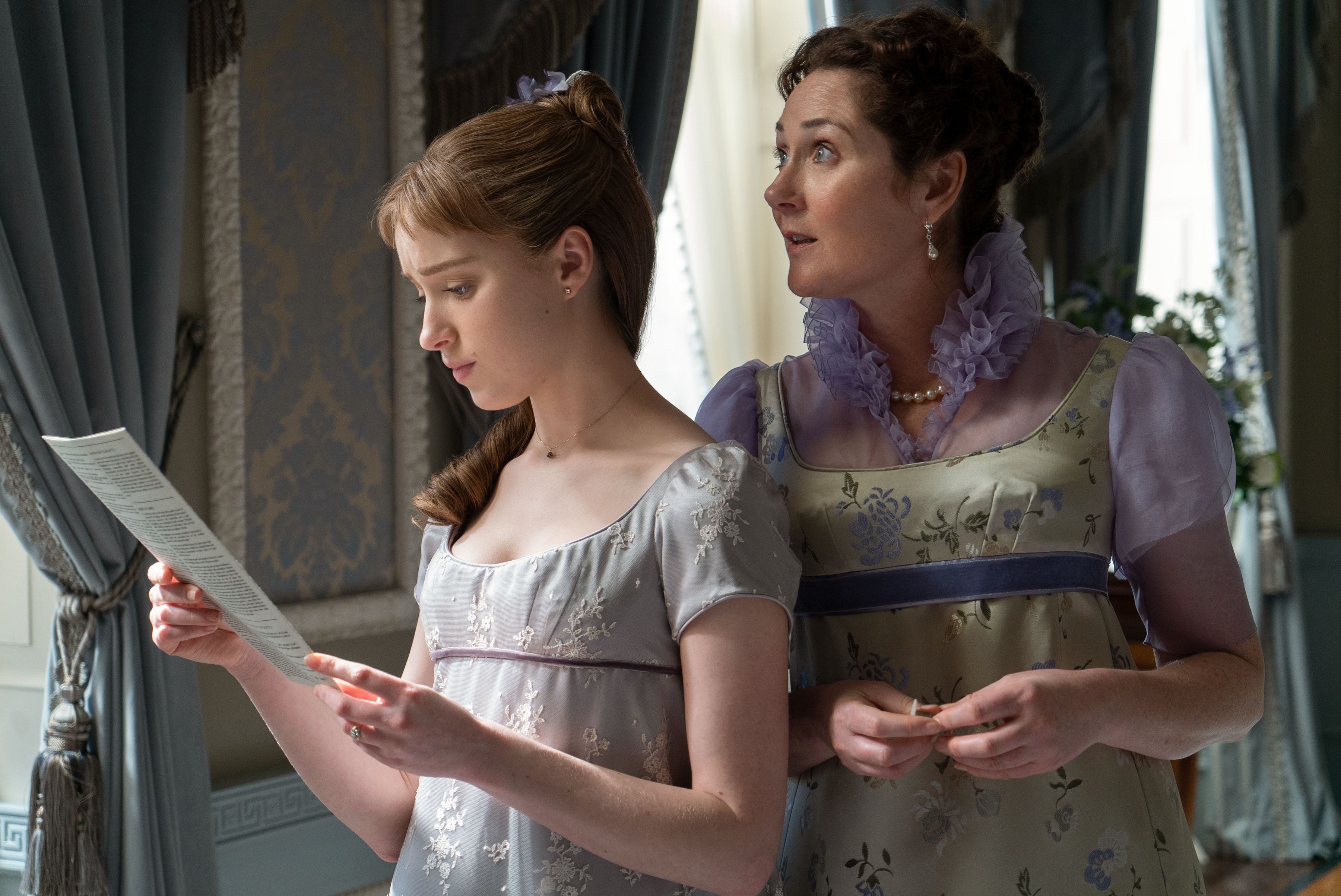Women gain power through gossip in 'Bridgerton'
Bridgerton's scandal sheet shows the early days of tabloid journalism and how it was used to gain power for those with none.

The latest updates, reviews and unmissable series to watch and more!
You are now subscribed
Your newsletter sign-up was successful
Want to add more newsletters?

ONCE A WEEK
What to Watch
Get all the latest TV news and movie reviews, streaming recommendations and exclusive interviews sent directly to your inbox each week in a newsletter put together by our experts just for you.

ONCE A WEEK
What to Watch Soapbox
Sign up to our new soap newsletter to get all the latest news, spoilers and gossip from the biggest US soaps sent straight to your inbox… so you never miss a moment of the drama!
This post contains detailed spoilers for Bridgerton.
Thirst for celebrity scandal existed long before Hollywood provided tabloid publications with lurid news items. While Lady Whistledown’s Society Papers in Bridgerton is fictitious, it points to the power of this particular information commodity long before Confidential, The National Enquirer, and TMZ existed. Reputation can make or break a person (even now) and in the status-driven world of Regency-era London, a rumor is a potential savior or devastating cudgel. Daphne Bridgerton (Phoebe Dynevor) is declared “flawless” by Queen Charlotte (Golda Rosheuvel) in the opening episode, but she is quick to learn that this lofty description doesn’t protect her from ruin if she is caught in the company of a man without a chaperone. The women of this period are without autonomy, regardless, it isn’t only the anonymous Lady Whistledown (voiced by Julie Andrews) who understands the effectiveness of a well-placed piece of juicy information.
“We shall do what women do. We shall talk,” Lady Violet Bridgerton (Ruth Gemmell) tells her worried eldest daughter when discussing a solution to the Lord Nigel Berbrooke (Jamie Beamish) issue. This potential husband is attempting to blackmail Daphne into marriage after the Dark Walk at Vauxhall incident — Daphne punched him after he grabbed her in the secluded gardens — suggesting she will be dishonored if this night-time activity was to become public knowledge. Not only would Daphne be smeared but so would the rest of her siblings (all seven of them). A single woman walking with a man is incredibly tame by 21st century standards but this is a far more conservative time. Lacking any agency, society gossip is feared but it can also be used to rectify a seemingly unsolvable problem.
Finding a smoking gun is not too hard when the loathsome and predatory Nigel Berbrooke is in the picture. Under the guise of getting to know the future in-laws, Lady Bridgerton invites his mother over for afternoon tea to score vital intel. Of course, Nigel’s mama is never going to spill a morsel about her precious boy, however, she is not the target of this particular plot. “The help hears everything, as we all know,” remarks Lady Bridgerton setting the plan in motion that will end Berbrooke’s threat to “wreak havoc” on this influential family if he doesn’t get his martial demands. A child out of wedlock (with a maid) and the refusal to pay child support is the perfect scandal to dispatch the odious suitor. “And who will believe a group of women over a man’s word?” Daphne desperately asks her mother, underscoring how little women are valued beyond their role as wife and mother.
This is where Lady Whistledown’s tattle sheet comes into play as a weapon to wield against the restrictions of this time. It is hard to dispense of a garbage man in the 1800s, but not impossible. Hearsay is the very thing Lord Berbrooke is using against Daphne to win her hand in marriage and yet it will also be his ultimate downfall. Using a whisper network, the Bridgerton women sew the initial seeds before it quickly takes on a life of its own, and it isn’t long before Lady Whistledown puts pen to paper. It is slower than a Gossip Girl blast, but no less impactful. In this case, Berbrooke is bested by a group of women brandishing unseemly information against him. Using this method is all the more delicious because of his attempt at extortion.
Blackmail and gossip go hand-in-hand, and at this point, Lady Whistledown is safeguarded because no one knows her real identity. Her authority is protected by anonymity (for now). This storyline has elements of historical truth and reflects that while rumor has been used by powerful men to discredit women, it is also a compelling weapon in a limited arsenal. “Gossip well,” Natalie Portman advised in a speech she gave at Variety’s Power of Women event a year after the Harvey Weinstein story first broke in The New York Times and The New Yorker. “If a man says to you that a woman is crazy or difficult, ask him, ‘What bad thing did you do to her?’ That’s a code word. He is trying to discredit her reputation,” she added in a step-by-step guide to toppling the patriarchy. The language might be somewhat different from the threats in Bridgerton but the sentiment is the same whether it is to destroy someone’s ability to marry or work — both will impact financial security. A “difficult” women will not get hired, a woman with suggested loose morals will remain a spinster. In each case, a man remains in control but gossip can unseat a predator.

The rich and famous have long been the target of scandal sheets dating back to the satirical Female Tatler that began in 1709 under the watchful eyes of editor Phoebe Crackenthorpe — aka “a lady that knows everything.” Just like Whistledown, Crackenthrope was an alias but rather than limiting her words to rumors, she also harnessed the power of the press to educate women. In Women’s Worlds: Ideology, Femininity and Women’s Magazines, it is noted in the chapter on 18th-century publications that “Whatever the sex of her creator, Phoebe Crackenthorpe remains one of the first instances of a female journalistic persona who trades on her femininity as a means of access to social power.” Whistledown is writing a century later when women-focused magazines took off, underscoring how this form of literature empowered women when they still lacked independence.
The latest updates, reviews and unmissable series to watch and more!
Extortion and scandal are perfect bedfellows. In 1925, editor of Broadway Brevities and Society (a New York tabloid established in 1916) Stephen J. Clow sentenced to prison for “conspiracy to extort money by threatening to publish derogatory items in the magazine.” The Golden Age of Hollywood is littered with cover-ups, so-called deviant behavior, and illicit affairs that made it into the pages of Confidential and infamous Los Angeles newspaper columns by Louella Parsons and Hedda Hopper. The big final Bridgerton reveal that Penelope Featherington (Nicola Coughlan) is Lady Whistledown plays into the notion that women aren’t just the subject of tattle material, they can control it too. The printing press is mightier than the sword in high society and women have found a place at the head of this particular table
Emma Fraser spends most of her time writing about TV, fashion, and costume design; Dana Scully is the reason she loves a pantsuit. Words can also be found at Vulture, Elle, Primetimer, Collider, Little White Lies, Observer, and Girls on Tops. Emma has a Master’s in Film and Television, started a (defunct) blog that mainly focused on Mad Men in 2010, and has been getting paid to write about TV since 2015. It goes back way further as she got her big start making observations in her diary about My So-Called Life’s Angela Chase (and her style) at 14.



